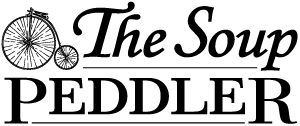That's Some Strong Stock

I have been quite inspired from my recent reading of Michael Pollan's inspired latest book, In Defense Of Food. Some of you may know his work from the curiously popular Botany Of Desire, then the groundbreaking Omnivore's Dilemma, after which he engaged in a well-publicized debate with Austin's own John Mackey. This book was inspired by the incredible response to his New York Times article entitled "Eat Food. Not Too Much. Mostly Plants," which was a shining beacon of liberation to eaters everywhere that there is a simple answer... that food does not need to be a quantitative, catalogued, fretted-upon, complicated endeavor in our lives. That the best we really can do is to eat food, not too much, mostly plants.
Pollan needed to amplify that statement, because it is easily derailed in various directions. Mostly he needed to define food, which is a funny thing, funny in a sad way... that food has been hijacked like so many other essential things in our lives (health, media, politics, and religion to name a few) by blind obeisance to base capitalistic principles to the point where it is no longer recognizable, where packaging is just real estate used for brand story inventing, advertising, cross-marketing, truth-bending, and the "food" inside is some twisted de-and-reconstructed substance, where the only word necessary on the packaging should be "apple" or "barley" or something that is plain and simple and easy, that there shouldn't be any numbers or any need for numbers, that there shouldn't be anything to hide or any facts to spin, that "apple" means "apple" and if your culture says an apple a day keeps the doctor away then eat an apple and be done with it, don't tell me the fructose is too much carbs in fact don't even say the word carbs to me. Read this book please to see all the ways that nutritionism has failed us over the decades and accidentally fueled the food manufacturing, food marketing, and pharmaceutical industries to get us to the point where we're afraid to eat an apple but find that there are 43 good reasons to eat an apple breakfast bar. You can't make health claims on something that doesn't have a package.
Now I know our business is nowhere near the golden ideals that Pollan suggests in his book. Maybe we've given you more fat than you needed in this dish or more salt than you needed in this dish or more fat for a culinary purpose but on the whole we sleep well at night knowing that we are doing something simple and good and fair. There are so many shortcuts that can be taken, so many teeny ways to bend the truth... Take for example chicken stock, which in a way is the crux of our whole operation. Many of you likely read the NY Times article on MSG a week or two ago... one of the funny (sad) things buried in the article is that that the hippie-friendly-sounding "autolyzed yeast extract" found in EVERYTHING THAT COMES IN A BOX OR PACKAGE in your favorite high-end-eco-supermarket, notably in the friendly-earthy-looking tetrapaks of chicken broth, is just another glutamate, not substantively different from MSG but has that natural-sounding "yeast" in it. And it's there to trick your tastebuds into LOVING that broth even though there's next to nothing in it. According to Cook's Illustrated, these yeast extracts "boost the flavor of beef [or chicken] by as much as 20-fold." That means that they only have to put one twentieth of the actual stuff in there, or you get one twentieth the amount of nutrient in your body. I've done calculations on our homemade stock vs. what tastes really darn good out of the tetrapak and found that our stock is between 20 and 100 times as strong as what you can buy on the shelf, on the best soup shelf in the best grocery store, but it doesn't have any yeast extract, so it doesn't fool your mouth and brain into thinking your body is actually going to receive nutrients that aren't really there. And that's just the tip of the proverbial iceberg. Please read this book to learn why we're never going to put numbers on our food, we're never going to claim it does this or does that or has lots of this or is low-that.
